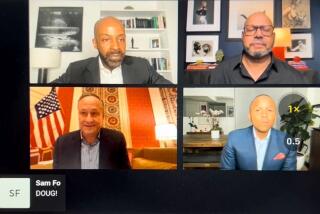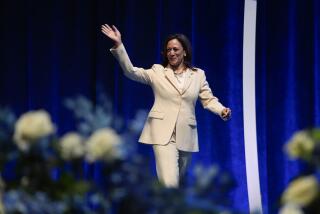Concerns Raised as Voter Turnout Dives : Politics: The showing for the 35th Senate District election was 11.8%. More special ballots are coming.
Elaine Carver, a frustrated polling place worker, wanted to beat a drum for voters on Election Day.
Only 5.2% of the 400,000 voters in the 35th state Senate District actually showed up at the polls during a special election May 9 won by Republican Ross Johnson. Because another 6.6% voted by mail the overall turnout was 11.8%, but the eerie quiet that day at precincts throughout the affluent coastal district astounded workers like Carver.
“It’s not only really sad, it’s pathetic,” said Carver, 38, who worked at a polling place at Newport Heights Elementary School near her home. “I’m terribly patriotic and this really upsets me. Voting is our right, and if we don’t use it, we’re lost.”
Poor voter turnout in special elections is nothing new in Orange County, but officials say the scant number of voters May 9 was the worst showing in recent history.
Some people say the unprecedented county bankruptcy has disenfranchised local voters. Others blame a dwindling respect for government in general.
Still others say special elections conducted apart from general elections naturally draw less attention.
But special elections are upcoming in the county in June, July and September, and political observers remain concerned over the potential for voter apathy. Among those is the June 27 countywide vote on Measure R, the proposed half-cent increase in sales tax to help the county recover from bankruptcy.
“We had a higher turnout--17%--in our campus elections than in the state Senate race,” said Mark P. Petracca, a UC Irvine political scientist and Irvine resident who said the United States ranks at the bottom among the major industrialized countries of the world in voter participation. “The most serious question that non-voting raises is the issue of legitimacy.
“How much lower can turnout drop before the system has eaten up all the legitimacy it has?” Petracca said. “How can you talk about a mandate for this or that or another thing when only one out of seven people voted for you? These are questions that ought to bother everyone.”
Even Johnson, the Sacramento veteran and new state senator who took over the seat vacated by County Supervisor Marian Bergeson, bemoans the lack of participation in his race.
“The conclusion is inescapable that it’s a sad commentary that more people don’t participate and vote,” said Johnson, a state legislator since 1978. “I wish I had something to suggest to change it.”
Poor election turnout is an issue that has been discussed widely lately at the federal, state and county levels. Federal “motor voter” legislation that enables voters to register at the Department of Motor Vehicles was an outcome of concern over poor turnout, but, so far at least, its implementation has been rebuffed by Gov. Pete Wilson, who claims it’s an unfunded federal mandate.
Poor voter turnout was one of the issues studied by an advisory voter task force convened by California Secretary of State Bill Jones following the November elections. Last month, the task force strongly recommended permitting all-mail balloting in local and special elections, a method that is cheaper than polling place balloting and has successfully increased turnout in such places as San Diego County.
County Registrar of Voters Rosalyn Lever said special elections cost about $1 for each registered voter. The two special elections--a primary and a runoff--in the 35th Senate District cost just under $800,000, funds that are paid by the state, Lever said.
But it would take special legislation to allow all-mail voting in Orange County, Lever said. In the meantime, Lever said the county has been doing what it can to make voting more accessible by attaching absentee ballots to all sample ballots mailed before elections to registered voters.
Another popular suggestion to increase turnout is to extend voter registration deadlines up to and including Election Day. It has been tried successfully in states such as Minnesota and South Dakota, where participation rates often hit 80%.
“Very often, people here get excited about an election and discover it’s too late to register,” Petracca said.
The county Republican Party has certainly been the beneficiary of the special election process. Besides Johnson, those in the county’s Sacramento delegation who were originally victorious in special elections with scant turnouts include state Sens. Rob Hurtt (R-Garden Grove) and John R. Lewis (R-Orange) and Assemblyman Mickey Conroy (R-Orange).
Party GOP Chairman Thomas Fuentes blames the media for the small turnout in the recent state Senate race.
“You virtually saw nothing about the race on television or the radio media and only very passing mention of it among the local newspapers,” Fuentes said, adding that the party has scant resources to use in getting people to vote. “Frankly, I’m not interested in stimulating Democrats to go, but I am interested in getting Republicans out to the polls, and we try our darnedest to do that.”
Fuentes is also proud of the fact that the county’s most conservative voters tend also to be the ones who can be counted on to get to the polls or mail an absentee ballot. He predicted these conservative voters will vote heavily to reject Measure R.
“These are the people most concerned about the impact of government on their lives,” Fuentes said.
The Republican success--they currently control all the elected offices in the county above the city council level--adds to the turnout problem, said Larry Agran, a former Irvine mayor and prominent Democrat. The lack of an active two-party system means it is “a foregone conclusion that 30-40% of the people, a number representing the Democrats and independents, will play no role in who is elected.”
“Orange County is pretty much an exclusively Republican operation,” Agran said. “What that means is there is simply not the competition for ideas across the full political spectrum. That’s a formula for growing voter apathy.”
Another part of the problem is the current selection process where candidates tend to be anointed by party bosses, said Bev Langston, a former Newport Beach school board trustee and member of the Newport Harbor Republican Women’s group.
Also, the media scrutiny and the dirty tricks among politicians has soured many potentially sound candidates from participating, thereby lessening the attractiveness of those who do run, she said.
“We seem to be dealing more and more with the lesser of evils among candidates,” Langston said.
Despite the problems, Bergeson is one who sees better days for voter participation ahead.
“As we get through the present fiscal crisis in this county there will be a lot more interest in government,” Bergeson said. “There will be a feeling that we should never let this happen again. “
More to Read
Get the L.A. Times Politics newsletter
Deeply reported insights into legislation, politics and policy from Sacramento, Washington and beyond. In your inbox three times per week.
You may occasionally receive promotional content from the Los Angeles Times.






